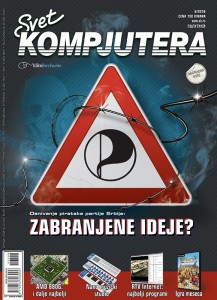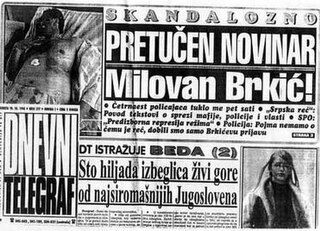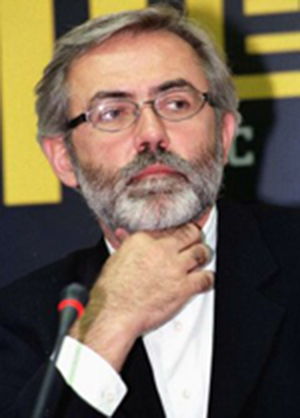Related Research Articles

Zoran Đinđić was a Serbian politician and philosopher who served as the prime minister of Serbia from 2001 until his assassination in 2003. He was the mayor of Belgrade in 1997. Đinđić was a long-time opposition politician and held a doctorate in philosophy.

Svet kompjutera is a computer magazine published in Serbia. It has the highest circulation in the country. Svet kompjutera deals with subjects on home, PC computers, tablet computers, smartphones, and video game consoles as well as their use for work and entertainment. Its aim is to inform the readers about the latest events in Serbian and world computer scene and to present products that are interesting for its readers. Its editorial staff sees this as their main task to advise computer users on how to use their hardware and software in the best way.

Politika is a Serbian daily newspaper, published in Belgrade. Founded in 1904 by Vladislav F. Ribnikar, it is the oldest daily newspaper still in circulation in the Balkans.

Mirjana "Mira" Marković was a Serbian politician, academic and the wife of Yugoslav and Serbian president Slobodan Milošević.

Blic is a Serbian web portal covering politics, economy, entertainment, and current events. The first printed edition of Blic was published in 1996, its online portal was launched in 1998, and Blic TV began broadcasting in 2022. Blic is part of Ringier Serbia's portfolio, which belongs to the international media company Ringier, headquartered in Switzerland. According to Gemius Audience research, Blic has been Serbia's most visited news portal since 2012.

Borba was a newspaper published in former Yugoslavia and Serbia, best known from the period when it was the official gazette of the League of Communists of Yugoslavia (LCY) until 1954 and Socialist Alliance of Working People of Yugoslavia thereon until its dissolution. Its name is the Serbo-Croatian word for 'struggle' or 'combat'.

Večernje novosti is a Serbian daily tabloid newspaper. Founded in 1953, it quickly grew into a high-circulation daily. Novosti also employs foreign correspondents spread around 23 national capitals around the globe.

Dnevni telegraf was a Serbian daily middle-market tabloid published in Belgrade between 1996 and November 1998, and then also in Podgorica until March 1999.
Evropljanin was a bi-weekly newsmagazine published in Serbia during the late 1990s. Launched in April 1998, it was visually modeled after the German newsmagazine Focus.

Slavko Ćuruvija was a Yugoslav and Serbian journalist, newspaper publisher. His murder on 11 April 1999 in Belgrade, FR Yugoslavia provoked international outrage and wide condemnation. In January 2014 two people were arrested and two others named by the Serbian police as suspects in Ćuruvija's murder, including Radomir Marković, former head of the State Security Directorate (RDB) from 1998 to 2001.

Branka Prpa, is a historian, author, and former director of Belgrade's Historical Archives.

The 1991 protests in Belgrade happened on the streets of Belgrade, the capital of Serbia and Yugoslavia when a protest rally turned into a riot featuring vicious clashes between the protesters and police.
Nikola Milošević, PhD was a Serbian writer, political philosopher, literary critic, and politician.

Dragan Đilas is a Serbian businessman and politician who served as the mayor of Belgrade from 2008 to 2013.

General elections were held in the Federal Republic of Yugoslavia on 24 September 2000. They included the presidential election, which was held using the two-round system, with a second round scheduled for 8 October. After the first round, the Federal Electoral Commission announced that Vojislav Koštunica of the Democratic Opposition of Serbia (DOS) was just short of the majority of all votes cast needed to avoid a runoff against the runner-up and incumbent president Slobodan Milošević. However, the DOS coalition claimed that Koštunica had received 52.54% of the vote. This led to open conflict between the opposition and government. The opposition organised demonstrations in Belgrade on 5 October 2000, after which Milošević resigned on 7 October and conceded the presidency to Koštunica. Subsequently released revised election results showed Koštunica with slightly over 51% of all votes cast.

Vladimir Arsenijević is a Serbian novelist, columnist, translator, editor, musician, and publisher. He lives and works in Belgrade. Arsenijević won the prestigious NIN Award for the Yugoslavian novel of the year 1994 for his novel In the Hold.
The mass media in Serbia refers to mass media outlets based in Serbia. Both state-owned and for-profit corporations operate television, magazines, and newspapers, which depend on advertising, subscription, and other sales-related revenues. The Constitution of Serbia guarantees freedom of speech.

Slobodan Milošević was a Yugoslav and Serbian politician who was the President of Serbia between 1989–1997 and President of the Federal Republic of Yugoslavia from 1997 until his оverthrow in 2000. Milošević played a major role in the Yugoslav Wars and became the first sitting head of state charged with war crimes.
"Vojko i Savle" is the title of the defamatory article targeting Serbian communist Gojko Nikoliš that was printed during early 1987 in the state-owned Politika daily. The term also refers to the subsequent political scandal the article caused in Socialist Republic of Serbia, a constituent federal unit of SFR Yugoslavia.
The League of Communists of Yugoslavia (SKJ) convened the highest forum for its 14th Extraordinary Congress on 20–23 January 1990 before it adjourned. It later reconvened for one day on 26 May. This was the last convened SKJ Congress and was composed of 1,655 delegates. The congress was chaired by the Macedonian Milan Pančevski, the president of the Presidency of the Central Committee, on 20–23 January and by the Serb Petar Škundrić when it reconvened on 26 May 1990. It reconvened without the delegates from Croatia, Macedonia and Slovenia and elected a provisional leadership, the Committee for the Preparation of the Democratic and Programmatic Renewal of the League of Communists of Yugoslavia, tasked it with convening the 15th LCY Congress on or before 29 September 1990.
References
- ↑ Gašenje Ekspresa - Ništa od vaskrsenja Archived 2011-09-10 at the Wayback Machine